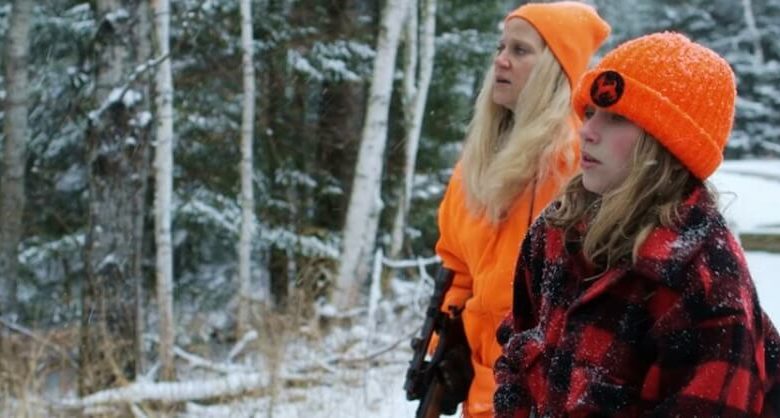
Some dramas centered on multi-generational women might focus on traditionally female roles like gardening, cooking or sewing.
“Cold November” zeroes in on the tradition of hunting.
The film introduces a family of mostly women, contributing to the first deer hunt of 12-year old Florence. Young Bijou Abas is so genuine as Florence you wonder if she’s playing herself. It’s clear from the early dialogue that preparation for this first deer hunt has gone on for most of Florence’s life.
“Cold November” isn’t a film that takes a male ritual and drops female characters into the story. It represents what happens all across the country: women and girls hunt, and it’s not a curiosity.
With the help of her mom, aunt, uncle and grandmother, Florence hears about hunter safety in the natural course of conversation. Another natural topic is the ethics of hunting, with discussions about what happens if the deer doesn’t die with the first shot, to the ritual of thanking the animal for providing meat for your family.
Florence’s grandmother is the matriarch of the family (played by the loving, yet strong Mary Kay Fortier-Spalding) who tells the youngsters about a time when hunting wasn’t just a tradition; it was about survival for her family. Hunting literally put food on the table when there was no other food.
That self-reliant streak is evident in all generations in “Cold November.”
FAST FACT: “Cold November” director Karl Jacob was inspired to tell this story, in part, to debunk the notion that hunting in an inherently male ritual.
The scenes of hunting, and the dressing and gutting of deer, are not for the faint of heart. Neither are they gratuitous. While these sequences don’t sugarcoat the reality of hunting for one’s own food, they also provide a realistic look at the full process — a primer for the viewer’s first hunt, perhaps.
While Florence deals with some of the same pre-teen experiences of her suburban peers, such as still playing make-believe, sadness over mean kids at school and the recent death of a family member, her life barely resembles those peers in a number of other ways.
Florence is never seen with a cell phone, TV or video games. She enjoys simpler experiences, like hanging out with adults, sitting in a tree stand and enjoying a sauna after a day in the woods.
No helicopter parenting here. Florence rides an ATV around the hunting property with no adult supervision and with (gasp!) no helmet. Florence’s mother leaves her in a tree stand alone with a fire to keep her warm, and with her great grandfather’s .30-30 rifle by her side.
Think about that in a suburban setting.
But Florence is indicative of the self-reliant children being raised in many parts of the country, still in touch with such traditions. She demonstrates how she solves ordinary problems without them becoming a disaster.
RELATED: ‘American Sniper’ Co-Star: Hunting Inspires Traditional Values
Even her surprise entry in to womanhood is treated with barely a shoulder shrug from Florence and a, “welcome to being a woman,” from her aunt. No drama, no Facebook posts about the worst day of her life. Just the normal course of business.
“Cold November” relates to the gun as a normal part of life. The glamorization of firearms in movies and their demonization on the nightly news ignore this very normal and historical role of guns: a tool.
The result of a successful Kickstarter campaign, “Cold November” shows what an independent film can do when left alone to tell a story that is highly relatable outside of Hollywood.
Laura Carno is a political media strategist and the founder of both I Am Created Equal and Coloradans For Civil Liberties. In 2017, she brought FASTER training for armed school staff members to Colorado ensuring, those armed defenders have access to world-class training. She is the author of “Government Ruins Nearly Everything: Reclaiming Social Issues from Uncivil Servants.” More about Laura can be found at LauraCarno.com. Follow her on Twitter, Facebook and LinkedIn.
